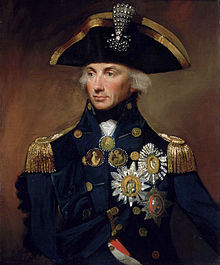The Viscount Nelson | |
|---|---|
 Portrait of Nelson by L. F. Abbott (1799) | |
| Born | 29 September [O.S. 18 September] 1758 Burnham Thorpe, Norfolk, Great Britain |
| Died | 21 October 1805 (aged 47) HMS Victory, off Cape Trafalgar, Spain |
| Cause of death | Gunshot wound |
| Burial place | St Paul's Cathedral, London, England |
| Spouse | |
| Parents |
|
| Military career | |
| Service | Royal Navy |
| Years of service | 1771–1805 |
| Rank | Vice-admiral of the White |
| Commands | Mediterranean Fleet |
| Battles / wars | |
| Awards | Order of the Bath |
| Signature | |
Vice-Admiral Horatio Nelson, 1st Viscount Nelson, 1st Duke of Bronte KB (29 September [O.S. 18 September] 1758 – 21 October 1805) was a British flag officer in the Royal Navy. His inspirational leadership, grasp of strategy and unconventional tactics brought about a number of decisive British naval victories during the French Revolutionary and Napoleonic Wars. He is widely regarded as one of the greatest naval commanders in English history.
Nelson was born into a moderately prosperous Norfolk family and joined the navy through the influence of his uncle, Maurice Suckling, a high-ranking naval officer. Nelson rose rapidly through the ranks and served with leading naval commanders of the period before obtaining his own command at the age of 20, in 1778. He developed a reputation for personal valour and a firm grasp of tactics, but suffered periods of illness and unemployment after the end of the American War of Independence. The outbreak of the French Revolutionary Wars allowed Nelson to return to service, where he was particularly active in the Mediterranean. He fought in several minor engagements off Toulon and was important in the capture of Corsica, where he was wounded and partially lost sight in one eye, and subsequently performed diplomatic duties with the Italian states. In 1797, he distinguished himself while in command of HMS Captain at the Battle of Cape St Vincent. Shortly after that battle, Nelson took part in the Battle of Santa Cruz de Tenerife, where the attack failed and he lost his right arm, forcing him to return to England to recuperate. The following year he won a decisive victory over the French at the Battle of the Nile and remained in the Mediterranean to support the Kingdom of Naples against a French invasion.
In 1801, Nelson was dispatched to the Baltic Sea and defeated neutral Denmark at the Battle of Copenhagen. He commanded the blockade of the French and Spanish fleets at Toulon and, after their escape, chased them to the West Indies and back but failed to bring them to battle. After a brief return to England, he took over the Cádiz blockade, in 1805. On 21 October 1805, the Franco-Spanish fleet came out of port, and Nelson's fleet engaged them at the Battle of Trafalgar. The battle became one of Britain's greatest naval victories, but Nelson, aboard HMS Victory, was fatally wounded by a musket ball fired from the French ship Redoutable. His body was brought back to England, where he was accorded a state funeral.
Nelson's death at Trafalgar secured his position as one of Britain's most heroic figures. His signal just prior to the commencement of the battle, "England expects that every man will do his duty", is regularly quoted and paraphrased. Numerous monuments, including Nelson's Column in Trafalgar Square, London, and the Nelson Monument in Edinburgh, have been created in his memory.